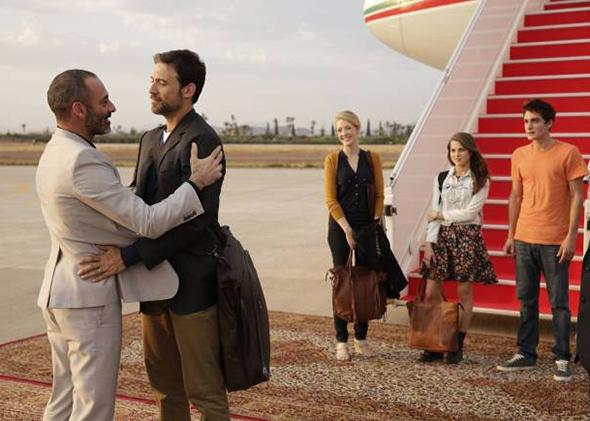FX’s Tyrant, premiering Tuesday night, arrives with its grand narrative arc in place: Bassam “Barry” al-Fayeed (Adam Rayner), the second son of a Middle Eastern dictator, hesitantly returns home after 20 years in America and will, over the course of the series, become the tyrant of the show’s title. If Breaking Bad was the story of Mr. Chips becoming Scarface, Tyrant is the tale of a pediatrician who will become Hussein, or Mubarak, or Assad, or any other of the Middle Eastern despots to whom the show simultaneously alludes. In Tyrant, the antihero steps out onto the front page, and then, as front pages tend to do, lies a little flat.
Tyrant is the creation of Gideon Raff, who previously made Prisoners of War, the Israeli show that was the source material for Homeland. Tyrant has also been developed for TV by Howard Gordon, one of Homeland’s creators as well as a longtime showrunner on 24. Like those shows, Tyrant boldly ransacks current affairs for storylines. Barry’s fictional country of Abbudin, ruled by his father Khaled (Nasser Faris), is nearly as rich as Saudi Arabia and has recently faced civic upheaval similar to Iran’s. The Baathist-like al-Fayeeds, secular autocrats who once carried out chemical weapons attacks against their own citizens, respond to internal unrest from militant Islamists by arresting, torturing, and killing political opponents. Abbudin is also an ally of the United States, which maintains a military base there and presumably appreciates the al-Fayeeds’ stance against fundamentalism.
Barry left his home in Abbudin to attend boarding school when he was 16 years old, ashamed to be part of a family of oppressors, and has not returned since. In Los Angeles he has made a life for himself, an attentive pediatrician married to a blond American doctor, Molly (Jennifer Finnigan), and the father of two teenagers, a sulky daughter Emma (Anne Winters) and a more shallow, excitable, gay son Sammy (Noah Silver). Barry asserts again and again that he is an American now, but as the early episodes unfold, it becomes clear that he says it hoping to make it so: His homeland exerts an inexorable hold on him.
One of the more interesting intimations of Tyrant is that having a working knowledge of American values might actually make Barry a more effective despot. Certainly, Barry’s time in the States seems to have made him better suited to rule than his brother Jamal (Ashraf Barhom), a man who has been bred for the job and has become a perverse, high-energy psycho as a result. (When we first see Jamal, he is raping a woman. When he’s done, he climbs into his red sports car—blasting Aerosmith—and goes and meets Barry and his family at the airport, where he jovially charms them. Later, he almost has his penis bitten off, leading to one of the funniest TV X-rays I’ve ever seen.) In comparison, Barry is a stoic, measured family man with a desire to do good, qualities that, for now, have him naively working to soften some of the al-Fayeeds’ most restrictive orders but may ultimately just help him present those restrictions to the world in a more palatable way. Perhaps it’s not just psycho-pathologies that make for a long-lasting evildoer, but perspective, patience, and a sense of optics.
But for all of Tyrant’s big themes, it can feel oddly small. Abbudin has that Qurac feel of all fictional countries meant to stand in for the Middle East: It’s nearly empty, there is allegedly an incipient revolution, but it appears to involve four people; no one speaks Arabic. This last is a concession to avoiding subtitles—conceivably, before long, the entire show would have to be subtitled—but the cost is, for example, a laughably inauthentic flashback in which Khaled praises his people about ending a civil war in … heavily accented English. (This choice has also robbed the show of a potentially powerful scene: The moment Barry begins speaking Arabic again.)
Rayner’s Barry is also unappealingly inert. An actor given an interior character like this has to do a lot of heavy emotional lifting with his face, but Rayner’s craniofacial muscles are apparently weaklings—or at least stuck benching “concerned.” At the end of the pilot, a panicked Barry is hustling his family onto a plane back to America, fearful Abbudin will suck them in forever. By the end of the second episode, he’s committed to staying. We “know” why Barry decides to stay in Abbudin, but that’s all in the script, not the performance: Barry tells his wife his responsibility for what happens in his home country doesn’t end just because he flees. Also, he may have a little natural tyrant in him. When he finds him, Tyrant may perk up yet.
